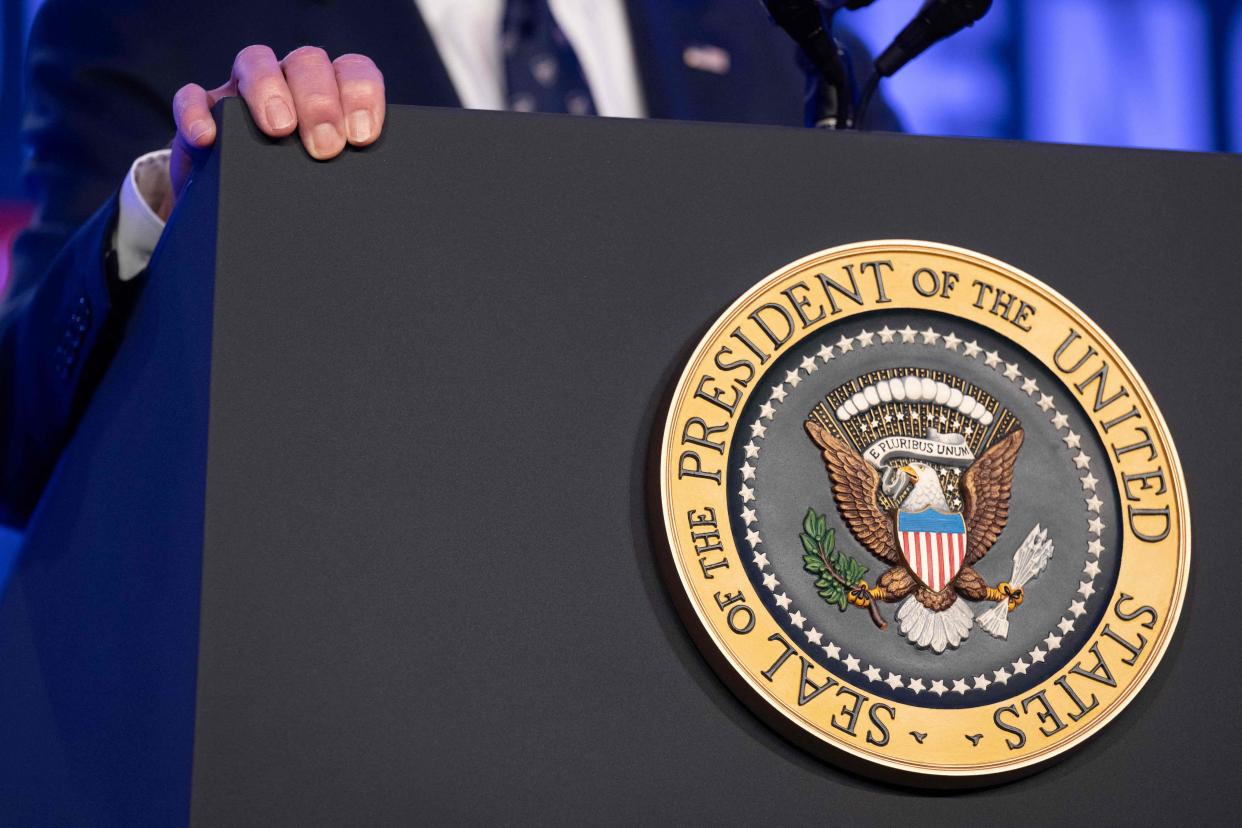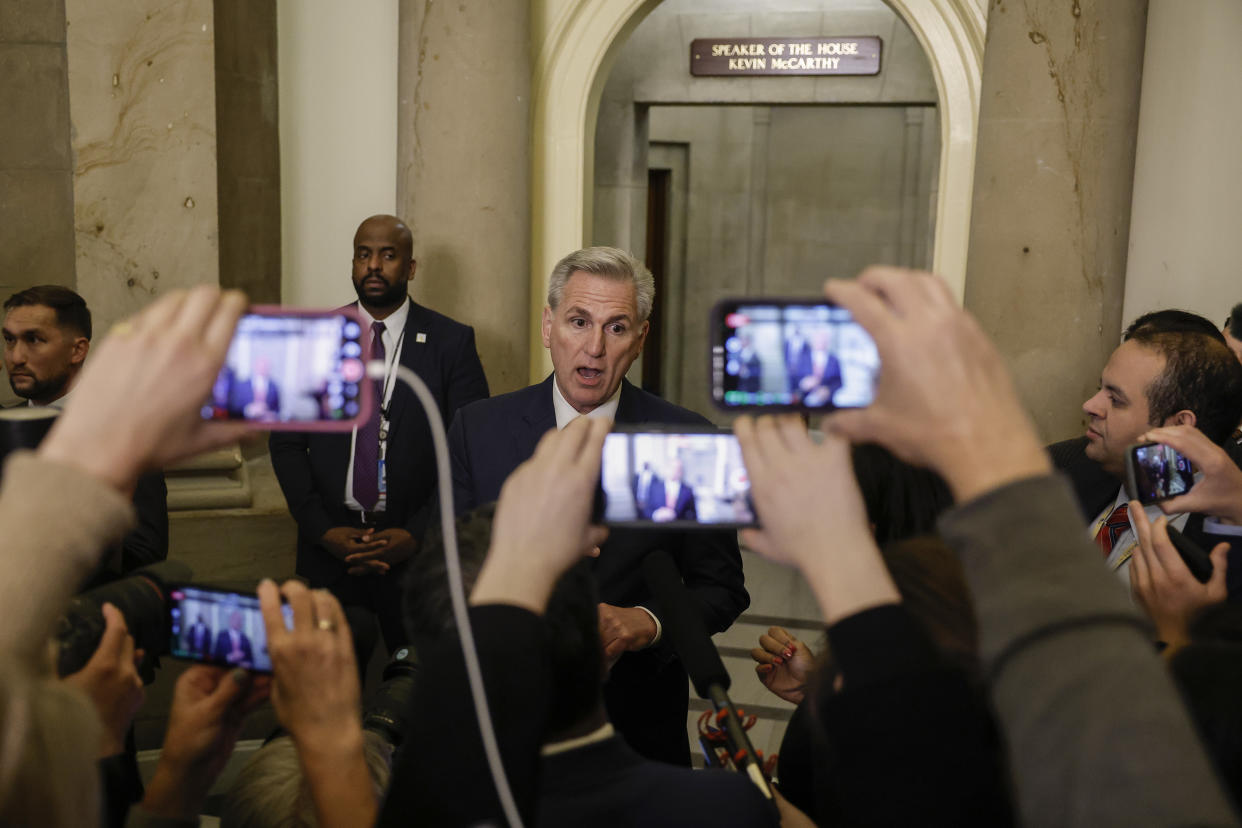President Biden laid out vast and expensive ambitions in his 2024 budget Thursday from shoring up Medicare and boosting spending across the federal government to reducing the deficit by nearly $3 trillion over the coming decade.
To pay for it all, he has a long slate of tax increases.
There are new taxes on the business world that would raise the rate on corporate income to 28% and levy new taxes on the controversial practice of stock buybacks. The sprawling 178-page document also contains proposals for new taxes on wealthy Americans — from changes to how investment income is taxed to a revival of his "billionaire minimum tax" on wealth.
"This is the start of a healthy dialogue," Shalanda Young, Biden’s budget director, said Thursday while she pushed back on the idea that these tax increases would hurt economic growth in the years ahead if enacted alongside other aides.
This is "a prescription for continuing the momentum that we have for the economy and putting us on a better fiscal path,” Deputy Director for the National Economic Council Bharat Ramamurti added during a Yahoo Finance Live appearance Thursday.
Of course, presidential budget proposals are largely symbolic efforts that are more about staking out a position over being enacted. An old saying in Washington about budgets is that “the president proposes and Congress disposes” but this year’s version will serve as an important marker of Biden’s priorities ahead of a debt ceiling fight and a likely re-election campaign.
“What the president has really here to use is the bully pulpit, meaning once he puts his budget forward, is he going to continue to push some of those ideas?” asked Committee for a Responsible Federal Budget President Maya MacGuineas in a Yahoo Finance Live interview on Wednesday. “If he's serious about it, he'll push it.”
Here are some of the new taxes Biden is proposing.
New taxes on Corporate America
In his budget, President Biden is renewing his long-standing calls for more taxes on Corporate America.
Biden wants to raise the corporate income tax rate to 28% from its current level of 21%. The White House maintains that this will ensure corporations begin to pay their fair share and will also be below the 35% rate that prevailed prior to the Trump tax cuts that were enacted in 2017.
The president also renewed his call to quadruple the recently implemented excise tax on stock buybacks, which he first unveiled during his State of the Union address. On Jan. 1, a new 1% tax on share repurchases went into effect, but has done little to damp business enthusiasm for the practice. The provision is currently set to bring in about $74 billion over the coming decade, and Biden is proposing to increase the rate to 4%.
During his interview, Ramamurti said the goal here is to make America a place where businesses want to invest, but “we should make sure that these companies are reinvesting earnings in more production and better quality jobs in the United States. That’s the balance we are trying to strike with this budget.”
The budget also proposes scrapping tax breaks that oil and gas companies receive that the White House says will save $31 billion. That move is sure to open up another front in the back and forth between the White House and oil companies over record profits they've enjoyed since the Russian invasion of Ukraine, while the White House says they have failed to invest in production.
The new proposals come after last year’s Inflation Reduction Act imposed multiple new taxes on businesses, including the 1% stock buyback excise tax and a new corporate book minimum tax.
Going after more taxes so shortly after last year's victory likely will inflame critics. Erica York, a senior economist at the Tax Foundation, argued in an interview Wednesday with Yahoo Finance that Biden’s policies were already “heading in the wrong direction and the president's budget is going to double down on that.”
“I would say wait and see how it plays out before you double down or quadruple down on it,” she added.
New taxes on wealthy individuals
Biden is also proposing new taxes on Americans making over $400,000 a year.
The president rolled out his most controversial proposal during this year’s State of the Union with a potential new tax that would target wealth, not just income.
“No billionaire should be paying a lower tax rate than a school teacher or a firefighter,” he said in his speech.
The president laid out new details on that proposal Thursday with a call for a 25% minimum tax on households worth more than $100 million as well as another idea to restore the top tax rate of 39.6% on single filers making more than $400,000 a year and married couples earning more than $450,000.
The budget also proposes increases in the capital gains rate for those with more than $1 million in income.
Finally, other tax ideas that were present in previous budgets were also revived for 2024, including the push to end the so-called carried-interest loophole and eliminating some tax breaks around real-estate profits.
All told, the various increases would fund nearly $3 trillion in deficit reduction over the next decade as well as other Biden priorities.
“This year’s budget comes at a critical moment for our country,” Young also noted on Thursday, adding that it would “invest in America” and ensure that the wealthy and large corporations begin “to pay their fair share.”
New taxes to shore up Medicare
Finally, the White House previewed new taxes to shore up the Medicare program earlier this week.
Biden is proposing increases on payroll taxes on Americans making over $400,000 per year; closing loopholes that shields some “pass-through” income from Medicare taxes; and allowing Medicare to negotiate on a wider array of prescription drugs.
Those provisions, which Biden reviewed in a New York Times op-ed on Tuesday, would extend the program through 2050.
Critics have noted that many of these proposals would be untested ways to fund the health care program for retirees. York also noted that some of the rule changes around the net investment income tax would help Medicare's finances by diverting some money from the government’s general fund.
“Of course that looks like you're strengthening Medicare, but you're creating a hole in the budget elsewhere,” she said, noting the plan also increases the net investment income tax from 3.8% to 5% and would therefore also bring in more money overall.
Also among the budget proposals is the restoration of the expanded Child Tax Credit that was enacted in the American Rescue Plan, but expired last year without being renewed by Congress.
Republicans have been promising for weeks that Biden’s proposals won’t see the light of day, but it will nevertheless increase pressure on House Speaker Kevin McCarthy (R-CA) to offer his own proposal in the coming months.
MacGuineas, who previewed the dueling proposals, noted that the White House budget focuses largely on tax increases, while the GOP plan revolves around spending cuts.
“Neither of them is realistic, and, frankly, neither of them is the right policy,” she said. “We need compromises on both.”
This post has been updated.
Ben Werschkul is Washington correspondent for Yahoo Finance.
Click here for politics news related to business and money
Read the latest financial and business news from Yahoo Finance
Download the Yahoo Finance app for Apple or Android
Follow Yahoo Finance on Twitter, Facebook, Instagram, Flipboard, LinkedIn, and YouTube
Source: Read Full Article




